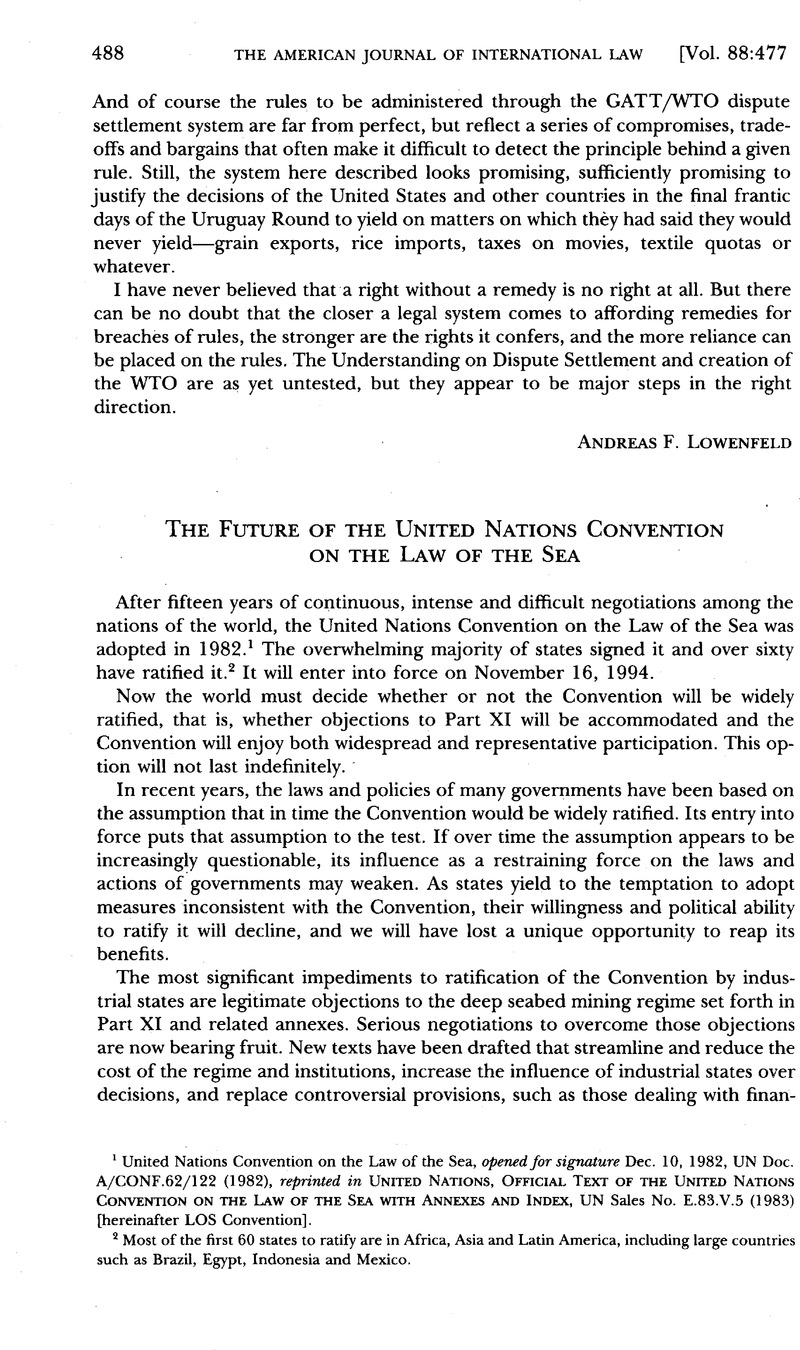Article contents
The Future of the United Nations Convention on the Law of the Sea
Published online by Cambridge University Press: 27 February 2017
Abstract

- Type
- Editorial Comments
- Information
- Copyright
- Copyright © American Society of International Law 1994
References
1 United Nations Convention on the Law of the Sea, opened for signature Dec. 10, 1982, UN Doc. A/CONF.62/122 (1982), reprinted in United Nations, Official Text of the United Nations Convention on the Law of the Sea with Annexes and Index, UN Sales No. E.83.V.5 (1983) [hereinafter LOS Convention].
2 Most of the first 60 states to ratify are in Africa, Asia and Latin America, including large countries such as Brazil, Egypt, Indonesia and Mexico.
3 Notable among these efforts is the work of the Panel on the Law of Ocean Uses, chaired by Professor Louis Henkin, whose papers include United States Interests in the Law of the Sea Convention, 88 AJIL 167 (1994); U.S. Interests and the United Nations Convention on the Law of the Sea, 21 Ocean Dev, & Int’l L. 373 (1990); Deep Seabed Mining and the 1982 Convention on the Law of the Sea, 82 AJIL 363 (1988); U.S. Policy on the Settlement of Disputes in the Law of the Sea, 81 AJIL 438 (1987); and Exchange Between Expert Panel and Reagan Administration Officials on Non-Seabed-Mining Provisions of LOS Treaty, 79 AJIL 151 (1985). Individual panel members and others have also written extensively on the issues involved.
4 John R. Stevenson was Legal Adviser of the U.S. Department of State from 1969 to 1972 and Ambassador and Special Representative of the President to the Third UN Conference on the Law of the Sea from 1973 to 1975. He has served as President and Honorary President of The American Society of International Law, and as a partner, and later Chairman and Senior Partner, of Sullivan & Cromwell. Bernard H. Oxman served as attorney-adviser and Assistant Legal Adviser of the U.S. Department of State from 1969 to 1977, was a member and later vice chairman of the U.S. delegation throughout the negotiation of the Law of the Sea Convention from 1969 to 1982, chaired the English Language Group of the Conference Drafting Committee, and now directs the Ocean and Coastal Law Program of the University of Miami School of Law.
5 Statement by the President, Mar. 10, 1983, 19 Weekly Comp. Pres. Doc. 383 (Mar. 14, 1983), reprinted in 22 ILM 464 (1983).
6 Convention on the Prevention of Marine Pollution by Dumping of Wastes and Other Matter, Dec. 29, 1972, 26 UST 2403, 1046 UNTS 120.
7 A reciprocal grant of similar rights off the United States coast would rarely be regarded as adequate “consideration” in such arrangements. Geography alone determines that few foreign states need to navigate past the U.S. coast to reach destinations outside the United States.
8 It also doubles, to 24 miles from the coast, the breadth of the contiguous zone in which smuggling and immigration laws may be enforced.
9 LOS Convention, Art. 192. Experienced international negotiators are well aware of the difficulty of achieving agreement to articulate an environmental norm in such direct and unqualified form.
10 Following the pattern of other marine pollution treaties, the environmental provisions of the Convention do not apply to warships and other government noncommercial ships and aircraft, but each state is required to ensure that its excluded vessels and aircraft act in a manner consistent with those provisions so far as is reasonable and practicable.
11 Two significant exceptions to compulsory arbitration or adjudication under the Convention are “disputes concerning military activities” and disputes “with regard to the exercise by a coastal State of its sovereign rights or jurisdiction.” The latter exception does not apply to coastal state violation of navigation rights and freedoms or specified environmental rules and standards. LOS Convention, Art. 297, para. 1, Art. 298, para. 1(b).
12 These provisions are what remain of a more ambitious proposal for revenue sharing by President Nixon in 1970.
15 This includes conservation measures that take into account the interdependence of species, optimum utilization, coordination between neighboring coastal states, special rules for species that migrate between fresh water and the open sea, cooperation in managing highly migratory species, and agreement with the coastal state on measures to conserve stocks that migrate between the economic zone and the waters seaward of the zone. Marine mammals are afforded special protection, including exemption from requirements for optimum utilization.
14 Chile recently declared a “mar presencial” of uncertain content. The effect of Argentine legislation is also unclear. Canada is under pressure from Newfoundland fishermen to reduce foreign fishing beyond the economic zone, and Prime Minister Chretien alluded to the possibility of a unilateral claim during his election campaign.
- 20
- Cited by




